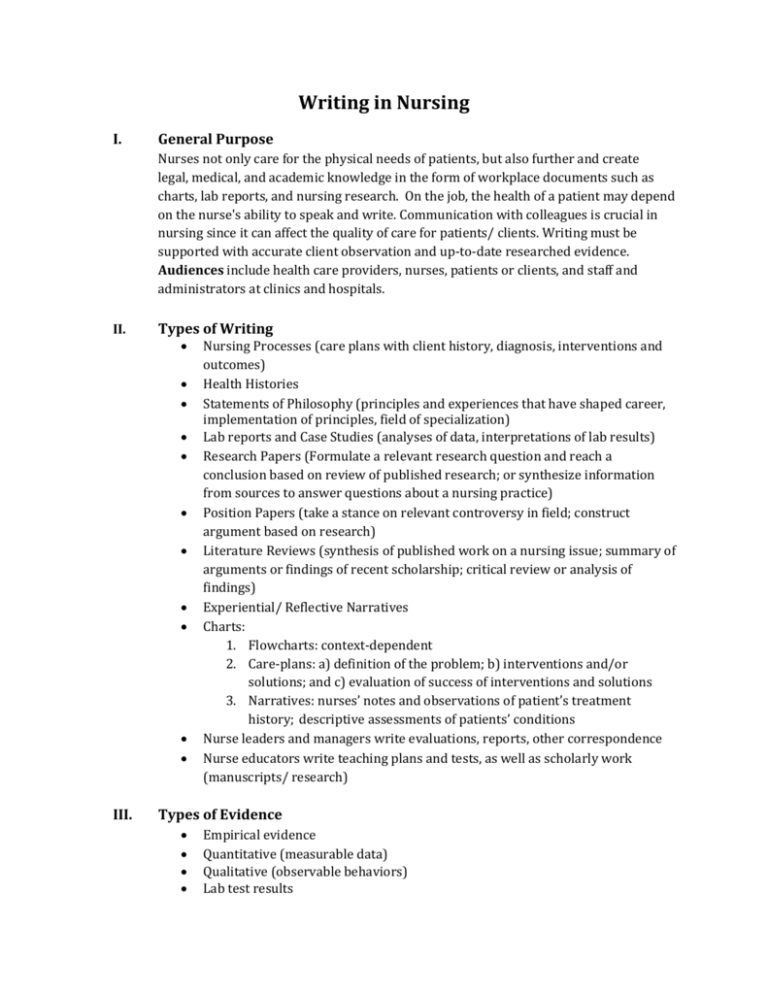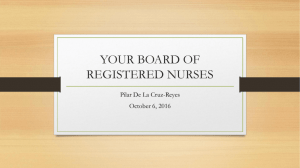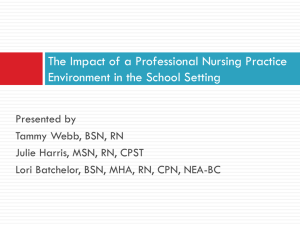Writing About Nursing - Writing Across the Curriculum | Appalachian
advertisement

Writing in Nursing I. General Purpose Nurses not only care for the physical needs of patients, but also further and create legal, medical, and academic knowledge in the form of workplace documents such as charts, lab reports, and nursing research. On the job, the health of a patient may depend on the nurse's ability to speak and write. Communication with colleagues is crucial in nursing since it can affect the quality of care for patients/ clients. Writing must be supported with accurate client observation and up-to-date researched evidence. Audiences include health care providers, nurses, patients or clients, and staff and administrators at clinics and hospitals. II. Types of Writing III. Nursing Processes (care plans with client history, diagnosis, interventions and outcomes) Health Histories Statements of Philosophy (principles and experiences that have shaped career, implementation of principles, field of specialization) Lab reports and Case Studies (analyses of data, interpretations of lab results) Research Papers (Formulate a relevant research question and reach a conclusion based on review of published research; or synthesize information from sources to answer questions about a nursing practice) Position Papers (take a stance on relevant controversy in field; construct argument based on research) Literature Reviews (synthesis of published work on a nursing issue; summary of arguments or findings of recent scholarship; critical review or analysis of findings) Experiential/ Reflective Narratives Charts: 1. Flowcharts: context-dependent 2. Care-plans: a) definition of the problem; b) interventions and/or solutions; and c) evaluation of success of interventions and solutions 3. Narratives: nurses’ notes and observations of patient’s treatment history; descriptive assessments of patients’ conditions Nurse leaders and managers write evaluations, reports, other correspondence Nurse educators write teaching plans and tests, as well as scholarly work (manuscripts/ research) Types of Evidence Empirical evidence Quantitative (measurable data) Qualitative (observable behaviors) Lab test results IV. Writing Conventions V. Record communications with others; all components of a patient’s history must be properly recorded. Data-driven evidence must be based on accurate, detailed information. Clear, objective tone and confidentiality and sensitivity are important. Avoid first person except for reflective writing. Use 3rd person objective voice for research, reviews, case studies, position papers, and when describing nursing practices. Passive voice is often used to record observations and procedures. Direct quoting is rare; paraphrase to show knowledge and to be more concise. Use standard abbreviations. Remember your audience: o Use plain language for clients, avoiding medical jargon o For health care professionals, be precise and use relevant medical terminology Terms / Jargon/ Acronyms VI. Data from nurses' charts Research finding in journals Direct observations of patients' physical or mental health OSHA—Occupational Safety and Health Administration EMR (Electronic Medical Record) HIPAA—Health Insurance Portability Accountability Act PSQIA—Patient Safety and Quality Improvement Act PHI—Protected Healthcare Information DHHS—Department of Health and Human Services http://nursing.flinders.edu.au/students/studyaids/clinicalcommunication/page _glossary.php?id=13 (contains a long list of acronyms used in clinical communication) Citation Style APA- American Psychological Association ***** Sources: Cullick, Jonathan S. and Terry Myers Zawacki. Writing in the Disciplines: Advice and Models. Boston: Bedford/ St. Martin’s, 2011. D-105-110. Print. Dick, Rodney and Katherine Wills. “From the Nursing Classroom to the Health-Related Workplace: Writing Skills Are Critical.” Write Away. The University of Louisville’s Writing-Across-the-Curriculum Newsletter, October 2001. Web. December 2012. Tompkins, Case, Eden Tompkins, and Elizabeth Angeli. “Writing as a Professional Nurse.” Purdue Online Writing Lab. April 2010. Web. December 2012.









